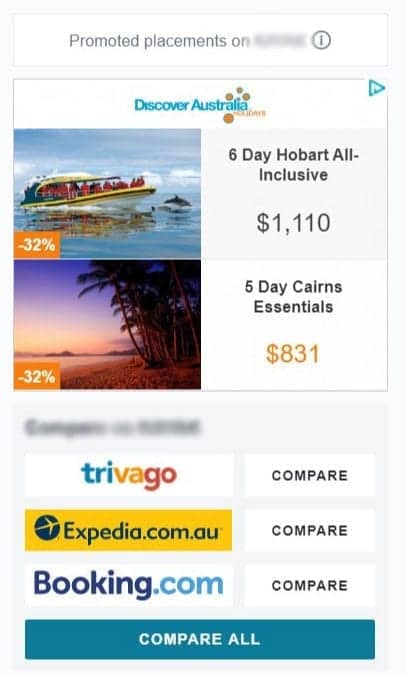Ever wondered if online travel agencies seem too good to be true? Well, they often are. In this article, we tell you why and how to avoid problems with online booking agencies.
So you’re planning your next holiday. You’ve selected your destination, put together your itinerary and cleared out your dates.
The next step is to book accommodation and plane tickets. You, being a thrifty individual who knows how to avoid wasting your hard-earned money, want to find the best available prices. So what do you do?
You type into Google ‘cheapest Surfers Paradise accommodation’ (Google always knows best, right?). Underneath half-a-dozen paid search results, you see what you’re looking for: a bunch of websites offering ‘cheap surfers paradise hotels’.
Awesome! You scan through a few. With so many different competitors, you know you’re guaranteed to get the cheapest, most cutthroat deals out there, right?
Wrong.
We’re going to walk you through exactly why trusting companies like these is so dangerous, and how to avoid getting scammed out of your money when holidaying. Keep reading.
How Do Online Travel Agencies (OTAs) Work?
Before we dive into the nitty-gritty of how booking agencies are getting the better of you, it’s good to understand how the industry as a whole works.
In a nutshell, online travel agencies (OTAs) function by collecting a huge variety of accommodation options together on one site, and then giving potential travellers an easy way to sift through them.
They make money through bulk-bought accommodation, commission and advertising revenue.
Just like a physical product, booking agencies will often buy rooms in bulk for a discounted price, and then resell them and make money from the mark-up.
For example, Booking Agency X might buy 100 rooms from a hotel at one time for $99 per night instead of $199 per night. They then resell them at $150 per night, keeping both travellers and their shareholders happy (at least, in theory).
Alternatively, they might take a percentage of the booking sale if the sale is made through their website – Investopedia reports that these percentages range from 20-25% for major companies, which is similar to those demanded by franchisers.
They also receive considerable profit from online advertising. This normally takes the form of banner ads, like the one below.

The Problems with OTAs
You’re probably thinking, “What’s wrong with all this anyway?”
So far? Nothing. In fact, on the surface, booking agencies seem like they’re offering a win-win solution for everyone.
But let’s take a closer look.
The problems start when you take check out the so-called ‘competitors’. Remember how you did that Google search and found all those different companies?
Well, chances are they’re actually owned by one of two conglomerates – to keep us legally safe, we’ll call them Conglomerate 1 and Conglomerate 2.
To give you an idea of how big these guys are, check out their annual reports from last year. In 2018, Conglomerate 1 brought in gross USD 14.5 billion, while Conglomerate 2 pulled 11.2.
Conglomerate 2 has a stable of twenty-three different booking site brands, while Conglomerate 1 owns thirteen. When megalithic corporations corner the market, it’s almost never a good thing for consumers. This article from Medium discusses how the travel agency duopoly arose and its implications for travellers.
They’re also known for their deceptive marketing practices, which, in several instances, have seen them charged by competition watchdogs and fined huge sums of money. Go onto virtually any OTA’s website, and you’ll find hard-sell tactics at work.
Rooms are often advertised with big red statements like ‘Only 1 left on our site!’ and ‘You Missed It!’ or ‘Booked Out’. This is designed to convince customers that there’s no more availability at that hotel, when, in fact, there’s just no more availability through that particular booking agency.
One of our favourites is strike-through comparisons which compare standard rooms to luxury rooms to deliberately mislead customers.
This has been going on for a while, but the last two years have been particularly bad.
In February 2018, the ACCC instituted proceedings against an OTA for misleading advertising.
The ACCC also launched an investigation into the high-pressure sales tactics used by multiple online travel agencies in Australia.
Towards the end of 2018, Dick Smith launched the Book Direct campaign in conjunction with the Accommodation Association of Australia, in order to stop small hotels being put out of business by the exorbitant commissions of booking agencies.
Earlier this year in Britain, six of the country’s biggest booking sites were forced to abandon shady sales tactics in light of a CMA investigation.
Online booking agencies also favour hotels who pay them better commission by giving them priority in their searches.
That means you, the traveller, are being shown hotels that pay higher commission, rather than the cheapest or best-fitting accommodation. This also impacts small business owners who simply can’t afford to fork over 25% of their earnings to giant multinationals.
It’s not as though booking through OTAs necessarily saves you money, either. A survey by Choice into travel agencies generally found direct, DIY bookings were normally much cheaper than going through agencies (although they were more time-consuming).
The long and short of it all? These guys can’t be trusted.
Avoid the Problems by Booking Direct
So you now you know about the dark side of online booking agencies, and you know how it directly impacts your hip pocket. But how can you get around it? After all, they’re everywhere and they’re so temptingly convenient.
It’s simple.
Just book direct.
If you’re staying at a destination where we have a property, ring up the resort/hotel or book online. It’s that easy.
You’re guaranteed to get the best available rate, because we set the best available rate. We know exactly how much our rooms cost, and that’s what we sell them to you for. We’re not trying to rip you off, or make middleman money from massive mark-ups. We want to give you an amazing holiday at prices that work for us both.
You can secure the room you want, not just the last one left on a booking site. You’ll get to choose a stay that’s right for you, rather than being shoehorned into a room that’s too small or too expensive for your needs.
You’ll have the possibility of free/discounted extras unavailable through anyone else.
You can upgrade more easily and generally cancel without losing your money (dependent on terms and conditions).
You’ll receive supportive, authentic customer service when booking. Our hotel staff want you to enjoy your holiday, and love helping match you to accommodation that’s right for you.
If you need to add an extra person at the last minute or downgrade to a cheaper room because someone pulled out, we can make it happen. You simply can’t get that kind of treatment from faceless companies who’ve never even been to the accommodation they’re selling.
Even if you’re staying somewhere without a Wyndham property, you’ll find that exactly the same principles apply, particularly if you’ve chosen a small or family-owned hotel who’ve consistently been gouged by online booking agencies.
What do you think? Would you prefer to risk problems by going with a booking agency, or save money by booking directly? Let us know by dropping a comment on our Facebook or Instagram.







